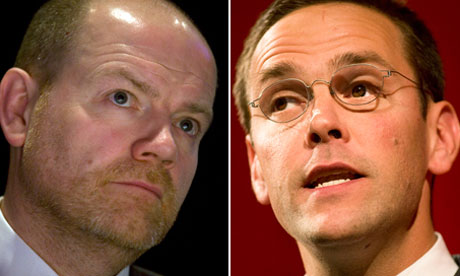Courtesy of the Guardian.
BBC’s Mark Thompson takes aim at Murdoch empire in MacTaggart lecture
 Mark Thompson and James Murdoch. Photograph: Murdo MacLeod/PAMark Thompson, the BBC director general, launched a scathing attack on Rupert Murdoch’s media empire tonight, warning thatBSkyB is too powerful and threatens to “dwarf” the BBC and its competitors.
Mark Thompson and James Murdoch. Photograph: Murdo MacLeod/PAMark Thompson, the BBC director general, launched a scathing attack on Rupert Murdoch’s media empire tonight, warning thatBSkyB is too powerful and threatens to “dwarf” the BBC and its competitors.Delivering the annual MacTaggart lecture at the Mediaguardian Edinburgh television festival, Thompson rounded on Sky’s chairman, James Murdoch, who used the same speech last year to attack the corporation.
“A year ago, James Murdoch fretted aloud about the lamentable dominance of the BBC,” he said. “He was able to do that only by leaving Sky out of the equation.”
Thompson said Sky was “well on its way to being the most dominant force in broadcast media in this country”.
He said that News Corp, in effect controlled by the Murdoch family, now enjoys unprecedented industry power in the UK. News Corp owns 39% of Sky and is in the process of buying the part of the broadcaster it does not already own.
“If Sky’s proposal to acquire all of the remaining share in Sky goes through, Sky will not just be Britain’s biggest broadcaster, but a full part of a company which is also dominant in national newspapers as well as [being] one of Britain’s biggest publishers,” Thompson said. That would be “a concentration of cross-media ownership that would not be allowed in the United States or Australia”.
In a sideswipe at the Murdoch press he also criticised newspaper coverage of the BBC, claiming: “Some newspapers appear to print something hostile about the BBC every week … the scale and intensity of the current assaults does feel different.”
Thompson also attacked Sky’s content, conceding that it had spent heavily on news and sport but saying it had failed to invest enough of its £4.8bn subscription revenues in British programming. He said Sky should be forced to pay ITV, Channel 4 and Channel 5 a fee for carrying their channels on its satellite platform through a “retransmission” charge.
That money could be used to invest in original UK programming, plugging a £300m funding gap that Thompson said had emerged since 2006 as advertising revenue has plunged.
He said Rupert Murdoch had argued in favour of a similar levy in the US, where News Corp owns the Fox channel. “He’s winning the argument,” Thomson said. “Fox is now receiving distribution fees from the cable companies. So why not introduce retransmission fees in this country as well?”
That could raise approximately £75m for commercial terrestrial channels whose revenues are under pressure because of an advertising recession.
“James may quibble with Rupert’s logic,” Thompson said. “I find it strangely compelling.”
In last year’s MacTaggart lecture James Murdoch accused the BBC of mounting a “land-grab” and described its ambitions as “chilling”.
Thompson responded by insisting that the BBC had never been so popular, citing research which showed that British television in general is highly valued by licence-fee payers.
“The purists have spent a generation making the free market case for abolishing the licence fee,” he added, in a thinly veiled reference to the Murdochs. “The British public agree with them less now than they did when they started.”
He continued: “Across the UK population, 71% of people say they’re glad the BBC exists.” Those figures were the same for readers of the Murdoch press, he said. News Corp owns the Times and the Sun as well as the Sunday Times and News of the World. He said the figure for Times readers was 83% and for Sunday Times readers 85%.
“I believe that the reason they have little traction on this subject is because their readers are able to compare what they read about the BBC with their own experience of the BBC’s services, week in, week out.”
Thompson also signalled that recent proposals to close the BBC’s generous pension scheme to staff would not be reversed, insisting that the corporation was “not afraid to shed the last vestiges of its bureaucratic past”.
He said he would remain in his post to negotiate the next licence fee settlement with the government next year. “Do I have the commitment and the energy to lead the BBC to where it needs to get to next? My answer is an unequivocal ‘yes’.” He added that he was “up for the fight”.
A spokesman for BSkyB said: “Mark Thompson has had a year to reflect on widespread and legitimate criticism of the governance of the BBC, its value for money and the effect its size is having on commercial competitors.
“He has failed at any point to address the impact that the scale and scope of the BBC’s activities is having on an all-media digital marketplace, which is worrying for the future of independent journalism.”



























